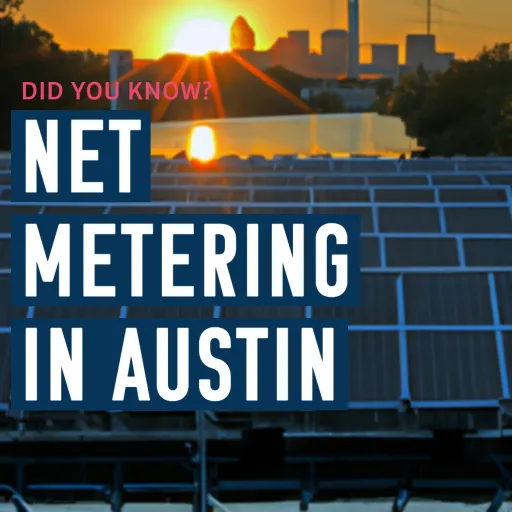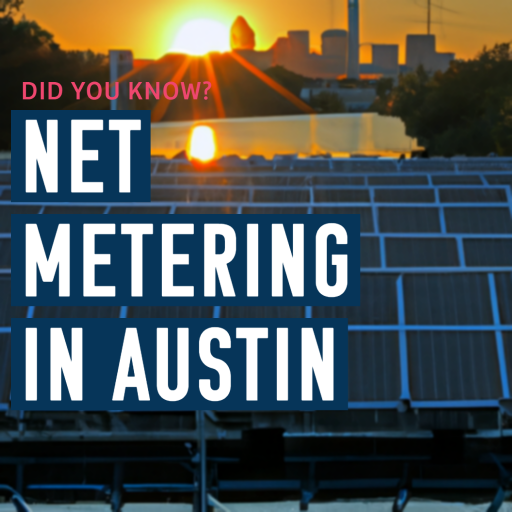LEARN ABOUT SOLAR POWER
WITH COOL SOLAR
LEARN ABOUT SOLAR POWER
WITH COOL SOLAR
Get the latest news and tips about solar power from Cool Solar. We make it easy for you to understand everything about this renewable energy source.
Get the latest news and tips about solar power from Cool Solar. We make it easy for you to understand everything about this renewable energy source.
// SOLAR COMPANY IN TEXAS
THE COOL SOLAR BLOG

Uncover the Financial Benefits of Net Metering Solar Panels Austin Texas
Uncover the Financial Benefits of Net Metering Solar Panels Austin TX
Introduction to Austin Solar Panels
Are you considering investing in solar energy? Are you looking to reduce your energy costs and take advantage of government incentives? Then it's important to understand the basics of net metering and why governments are investing in Austin solar net metering. Here at Cool Solar, we believe in providing you with the most up-to-date information on net metering policies, government incentives, and the benefits of solar net metering so you can make informed decisions about your solar power use.
Austin Solar Panel System Incentives
Cool Solar Power is an Austin business that offers best solar panel installation solutions for Austin TX and the surrounding areas. Our community-focused Solar Panel Installers have been serving Central Texas businesses since 2013.
If you didn't know, Austin Energy offers solar credits! Your Solar panel systems can earn solar credits that apply to your electric bill and increase the property value of their home [2]. Austin Energy also offers a $2,500 rebate for completing a solar education course and installing a qualifying solar photovoltaic (PV) system on your home [3][4]. Commercial customers can take advantage of Austin Energy's Commercial Solar Performance-Based Incentives [5].
In addition to supporting, you can also use all state incentives like the Austin Energy solar rebate. Incentives cannot be guaranteed - reserve now!

What is Net Metering and What Are Its Benefits?
Net metering is a process in which solar energy customers are compensated for any excess electricity they generate. For example, if you produce more electricity than you use, the utility company will purchase the excess electricity from you at a rate that is equal to what you pay for electricity. This allows solar energy customers to get the most out of their energy investments. Furthermore, net metering can help reduce electric bills and provide additional savings.
Net metering increases demand for solar energy and creates jobs for installers and other related industries [3][4].
It helps reduce pressure on the electric grid by smoothing out demand curves for electricity [3].
Homeowners can see significant savings on their utility bills through net metering, as they are credited for returning solar electricity to the grid and offsetting future electricity taken from the utility [1][2].
Distributed solar offers net benefits to the entire electric grid by reducing transmission costs, avoided capacity costs, and avoided energy costs [4].
Studies and research by public utilities commissions, consultants, and research organizations provide substantial evidence that net metering is more beneficial than costly [4].
Why Are Governments Investing in Solar Net Metering?
Governments around the world are investing in solar net metering to encourage the use of renewable energy sources and to reduce greenhouse gas emissions. This is done by providing incentives, such as tax credits and subsidies, to those who invest in solar power. Governments are also investing in solar net metering to create jobs in the renewable energy sector, which will help to boost local economies.
Net metering allows customers with their own generation capacity to be financially compensated for the energy they produce, which improves the financial return on investment of their on-site distributed generation (DG) systems [1][3]. Net metering is also seen as a way to reduce cost shifting from non-DG system owners to those who have invested in DG [2][3]. Studies have found that distributed solar can provide significant benefits to all electricity customers through reduced infrastructure investments and taking pressure off oil and gas [2].
In addition, net metering has been found to provide $36 million in benefits to all NV Energy customers [2], and Mississippi Public Services Commission concluded that the benefits of implementing net metering for solar PV outweigh the costs in all but one case [2].

FAQs
What Are the Benefits of Net Metering?
Net metering is an excellent way to reduce energy costs and increase energy efficiency. Additionally, it can help reduce greenhouse gas emissions and create jobs in the renewable energy sector. Furthermore, net metering can help reduce electric bills, provide additional savings, and increase property value.
How Does Austin's Solar Net Metering Policy Compare to the Rest of the Country?
Austin's Solar Net Metering policy is one of the most generous in the country. The policy allows customers to receive a credit on their electric bills for the excess solar energy they produce. Additionally, the program requires Austin Energy to purchase solar energy at a rate that is equal to or greater than what customers pay for electricity.
What Are the Benefits of Investing in Solar Net Metering in Austin?
Investing in solar net metering in Austin can provide numerous benefits, including reduced energy costs, increased energy efficiency, reduced greenhouse gas emissions, and job creation in the renewable energy sector. Additionally, solar net metering can help reduce electric bills, provide additional savings, and increase property value.
What Are the Specifics of Austin's Net Metering Policy and How Can It Help Local Residents?
Austin's Net Metering policy is one of the most generous in the country. The policy allows customers to receive a credit on their electric bills for the excess solar energy they produce. Additionally, the program requires Austin Energy to purchase solar energy at a rate that is equal to or greater than what customers pay for electricity. This policy can help local residents reduce their electric bills, increase savings and property value, and create jobs in the renewable energy sector.

How to Set Up Solar Net Metering for Your Home?
Setting up solar net metering for your home can be a great way to reduce your electricity bills and help the environment.
To get started, you will need to have a solar panels installed on your property. You can hire from the best solar companies in Austin (cough...cough...Cool Solar) a professional solar installer to assess your energy needs and recommend the right system for you.
Once the solar panels are installed, you will need to contact your utility company to apply for net metering. They will install a special meter that tracks the amount of electricity you use and the excess electricity your solar panels generate.
When your solar panels produce more electricity than you need, the excess electricity is sent back to the grid and credited to your account, which you can use to offset future electricity bills.
By setting up net metering, you can maximize the financial and environmental benefits of solar energy for your home.
What Are the Specific Solar Incentives Available in Austin TX?
Austin's Net Metering policies are designed to encourage the use of renewable energy sources and to reduce greenhouse gas emissions. Austin's Net Metering program allows customers to receive a credit on their electric bills for the excess solar energy they produce. Additionally, the program requires Austin Energy to purchase solar energy at a rate that is equal to or greater than what customers pay for electricity.
Austin TX has a variety of solar incentives available to residents, including rebates and tax credits. Additionally, Austin Energy offers a Solar Buyer's Group program, which provides discounted solar installation services to customers. Furthermore, the city offers a Solarize Austin program, which provides financial incentives to those who install solar energy systems on their homes or businesses.
Statewide Net Metering?
Austin, TX does not have a statewide net metering policy [1][2], but seven retail electric providers, as well as many municipal utilities and electric cooperatives, offer solar buyback plans and net metering incentives [2]. Austin Energy is the municipal utility of Austin and offers separate solar buyback programs for residential and commercial clients [2].
The Value of Solar (VoS) rate is the rate at which Austin Energy credits solar customers for the energy produced by their on-site energy systems [3]. When your rooftop solar system produces more electricity than your home is using, the excess flows back onto the grid to other users.
With a “buyback” electric plan, that earns you bill credits or payments from your utility company [4]. Larger systems benefit most from “net metering” plans that credit all excess generation at the full retail rate [4]. Smaller systems benefit most from lower import rates or Time-of-Use Rates like “free nights” (depending on usage patterns) [4].
In conclusion, solar energy systems can be a great investment for those living in Austin.
Not only will you have the potential to save thousands of dollars over 20 years on your electricity bills, but you could also take advantage of net metering and other incentives from utility companies. Before deciding whether or not to install solar panels, make sure that you do some research into the options available and consult with an expert who can provide advice tailored specifically to your needs. With careful planning and consideration, installing solar panels is a smart decision that could benefit both your wallet and our environment!
Is It Time to Install Solar Panels?
It all depends on your property and your needs. If you are looking to completely run on solar power, then you must have an energy consultant review your energy consumption and your property to see the best options for you. Solar panels usually come with a 25 year lifespan and require little maintenance, so it may be worth the investment. If you are simply looking to reduce your electricity bill, then you can consider installing solar panels that will partially offset your energy usage as well as potentially earn incentives through some utility companies.
Installing solar energy systems is often a rewarding investment, and they offer many advantages. Because solar panels generate electricity, their energy can dramatically lower your monthly energy costs. You could actually have savings of around 18k over 20 years. Use the calculator here for a free quote from a professional Austin TX solar company.

Installation with Cool Solar Companies in Austin
Compared to other energy sources, the cost of solar energy will likely appear to be costly at first glance. It all depends on your choice of solar panels for your house. We can provide a free energy audit on your home so you will find optimum energy efficiency and optimum energy saving options for your home. Second, it is important to know about the incentives available for solar panels in your region.
Solar Savings Calculator for Austin
For more information about the benefits of implementing solar in your household, see below. We offer solar panel system installs in Texas and roofing services. Changing to a solar energy system in the state of Texas will reduce your carbon bill by about $8799.93 for 20 years. If a solar array costs 12850.00, it will take 9.9 years to install.

Best Solar Panel Company - Cool Solar Power Texas
We are a solar company based in Austin, Texas that serves throughout the great State of Texas.
We'd love to serve you for your residential solar panel systems and ensure the best solar panel prices! With ZERO upfront costs and 30% federal tax incentives for your energy usage, your solar systems could completely wipe your utility bill.
"How much electricity will I need for my solar costs invested to pay my utility bill?"
Schedule a time with our Energy Consultants to define the cost per watt and potential solar savings through our solar calculator.
(830) 832-4867
Click Here for your Free Home Efficiency Solar Report for your home!
FAQS: RESIDENTIAL SOLAR PANEL INSTALLATIONS
How Long Do Solar Panels Typically Last?
Solar panels have a lifespan of 25-30 years on average. Proper maintenance, such as cleaning and inspections, can help prolong their lifespan. However, it's important to note that over time, the efficiency of the panels will decrease, typically at a rate of 0.8% per year, which can impact the amount of energy produced.
Is A Solar Powered Home Possible?
Yes, using solar power to run a household is entirely possible in this day and age. With the ever-evolving technologies surrounding solar panel systems, the amount of energy that can be produced by the sun is now more than enough for a home's daily power needs. This includes powering lights, air conditioning, appliances, and other essential items.
When installing solar panels on a roof or in an area with ample sunlight, homeowners can take advantage of Texas' plentiful sunshine year-round. Solar cells convert the sun's energy into electricity that can be used in your home. For optimal performance and maximum efficiency, it's important to have high-quality solar panels and batteries in order to effectively store the energy collected by these cells. A premium battery system will then allow you to store any excess energy during sunny days so you have power even during those long Texas nights.
What Should I Consider Before Installing Solar Panels?
Before making the decision to install solar panels, it is vital for you to research a few key factors and ask questions to ensure your roof is the right shape, type, orientation, direction and slope and strong enough to support your investment. You should also check up on local rebates and incentives available in your area, as well as warranties offered by the company you are considering hiring.
Additionally, be sure to look into any regulations set forth in your homeowners association (HOA) that may impact whether or not solar energy can be utilized on your property. It is also important for you to assess the current energy efficiency level of your home. Knowing how much energy you typically use on a regular basis will help determine how much solar power you need to provide the necessary amount of electricity for your family’s daily needs. You will want to factor in the cost of solar power in your area and any additional costs associated with installation when deciding which option is best suited for you financially.
In most cases, a professional installer should be consulted prior to installing new solar panels in order to make sure everything has been properly evaluated before proceeding with installation. Understanding all of these components can help ensure that you make an informed decision on whether or not solar energy is right for you.
How Many Solar Panels Do I Need?
By looking up your home's hourly energy requirement in kWh over a 30-day period, you can determine how much electricity you will need each month and therefore how many solar panels are required. This data is often available on your monthly energy statements or by simply asking your utility provider to calculate it for you.
In addition to the number of watts needed per panel (either 150W or 360W), you will also need to consider the number of peak sunlight hours in your area for the time of year when installing the system. This can vary drastically based on where you live, so an online search should provide this information quickly and easily. Once all these factors have been taken into account, then you can determine the total amount of electricity generated from a specific number of panels that best fits your needs.
It is important to note that although more wattage typically means more energy production, higher wattage doesn’t always mean savings if it’s not necessary for the size of system being installed. Furthermore, solar systems with high wattage may require larger wiring and other equipment which could increase installation costs significantly. Therefore, it is essential that homeowners do their research and understand exactly how much power they need before making any decisions regarding their system's specifications.
Additionally, it’s beneficial to seek professional advice from a qualified solar installer who can help design a customized solution tailored to meet your individual needs while still providing optimal cost savings for years to come!
Want To Automatically See How Many Panels You Need?
Begin with our Savings Calculator and we can do the work for you!
LOOKING FOR MORE?
RESERVE YOUR FREE CONSULTATION.
To get started on solar panel installation, send us your information.
We'll review your information and contact you to schedule an appointment.
An energy consultant can meet with you either in person or virtually to provide a custom proposal tailored to the size and design of your system, as well as financing and long-term savings options.
LOOKING FOR MORE?
RESERVE YOUR FREE CONSULTATION.
To get started on solar panel installation, send us your information.
We'll review your information and contact you to schedule an appointment.
An energy consultant can meet with you either in person or virtually to provide a custom proposal tailored to the size and design of your system, as well as financing and long-term savings options.


